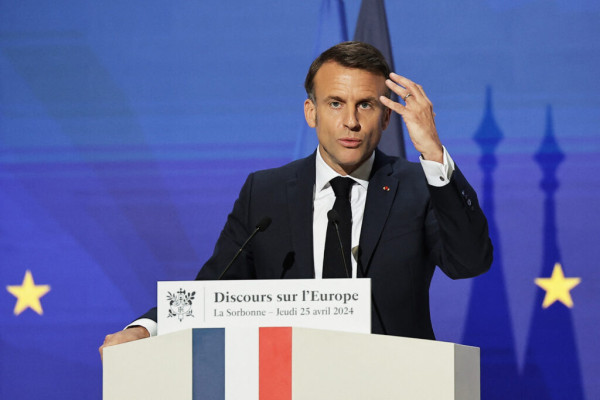More cash, less screen time: 5 policy takeaways from Macron’s Sorbonne speech
 |
PARIS — French President Emmanuel Macron outlined his priorities for the future of the European Union on Thursday in an almost two-hour stump speech with about six weeks to go until the European election in June.
The marathon address at Sorbonne University in Paris covered everything from the recent farmer protests to financial regulation.
Here's what you need to know:
More cash
Macron wants Europe to become the global leader by 2030 in five sectors: artificial intelligence, quantum computing, the space industry, biotechnology, and new forms of clean energy such as hydrogen and nuclear fusion.
A vaste programme, some might say.
Accordingly, the French president has called for a "public investment shock" and to "double Europe's financial capacity," also by making greater use of the EU's own revenue sources such as levies from the carbon adjustment mechanism.
Since public money won't be enough, Macron also urged progress on the capital markets union (CMU), a decade-old plan to build a single market for capital, taking advantage of the bloc’s combined economic strength. He said the EU should give itself no more than one year to unlock that file.
"We have been promising this for too many years," Macron said.
The CMU is struggling to see the light of day as a dozen countries are pushing against tougher and more centralized supervision of capital markets in the hands of ESMA, the EU markets watchdog.
France, however, is determined to move forward with a smaller group of like-minded countries to bypass opposition from smaller nations.
“Every year our savings … go to finance the Americans, or in any case the non-Europeans … it is an aberration,” Macron said, stressing that EU capital markets should become more attractive.

Europe first
The EU should favor local companies over foreign rivals when it comes to public financial support in strategic sectors like defense and space, Macron said.
The French president has historically been reluctant to use EU cash to buy foreign weaponry, including within the framework of the European Peace Facility, an off-budget fund that reimburses capitals for the military kit sent to Kyiv in its war against Russia.
Macron said that the EU should follow the United States and China's examples and prioritize European companies.
"Who saw the American defense or energy department financing a European emergent actor?" he said.
The French president proposed to enshrine a "European preference" principle in EU treaties, but didn't elaborate on whether that would also mean favoring European companies in public tenders, something France has advocated.
He said the EU's competition rulebook should be relaxed to pave the way for so-called European champions, a long-standing goal for France and Germany.
EUROPEAN PARLIAMENT ELECTION POLL OF POLLS
All 3 Years 2 Years 1 Year 6 MonthsSmooth KalmanFor more polling data from across Europe visit POLITICO Poll of Polls.
"We must take responsibility for an evolution of our competition policy to help European champions emerge," he said, hinting at the debate on relaxing the EU merger rules.
ECB, but make it green
Macron called for potentially radical changes to the European Central Bank’s mandate, pushing for a decision on how to integrate growth or even climate goals into the bank’s objectives. Because the ECB is bound by its aim of maintaining price stability in the EU, it doesn’t factor political goals into its decision-making in the same way other central banks can.
Macron called for the EU to revise the application of its banking prudential rules, arguing that the bloc should not be over-regulating compared to the rest of the world.
The banking industry and some EU countries have been lobbying the bloc to relax forthcoming updates to its capital rules for banks, which implement globally agreed standards that were put in place after the financial crisis to reduce the sector’s risks.
Because the U.S. appears likely to delay or change its rollout of the updated rules, Macron doesn’t want European banks to be bound to tighter rules if other jurisdictions postpone the updates.
Watch out, NATO
Some of the French president’s proposals to bolster the bloc’s defense industry and military preparedness seem to come at the expense of NATO.
While warning that Europe should not rely on the U.S. for its security, Macron called for a new “European defense initiative,” hinting that NATO is not the only forum for European capitals to discuss such issues — comments in sharp contrast to those of European Commission President Ursula von der Leyen, who earlier this month sought to reassure NATO that Europe’s push for a greater role on defense doesn’t diminish the military alliance’s importance.
In an obvious jab at NATO’s role in Europe’s defense, Macron also said Europeans should promote their own weapons standards. (The military alliance is traditionally in charge of setting weapons standards and NATO officials have said the EU should focus on NATO standards alone.)
Less time on TikTok
Macron also floated the idea of Europe-wide rules on screen time for minors.
"We must regain control of the lives of our children and teenagers, in Europe, and impose digital majority at age 15, not before," Macron said.
The president's call came as his government is increasingly focusing on youth and education issues. France has already passed a bill to ensure that users under 15 years cannot access social media and other platforms without their parents' consent. The French rules never took effect, however, because they don't comply with EU legislation, as the European Commission noted in a letter to Paris last year.
Macron also called for stricter moderation rules on social media.
"It is a civilizational and democratic fight," he said.
Océane Herrero contributed reporting.